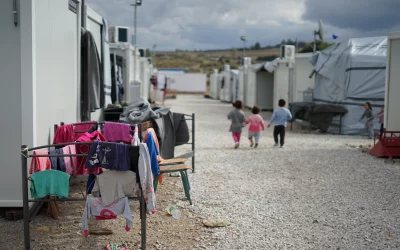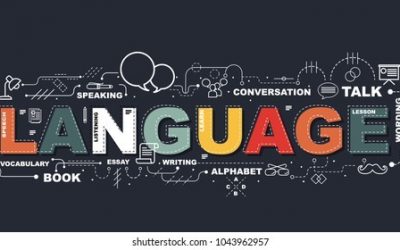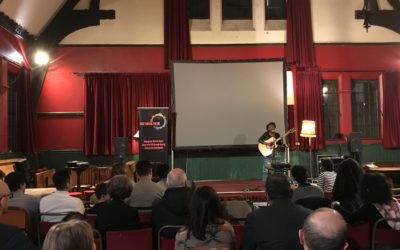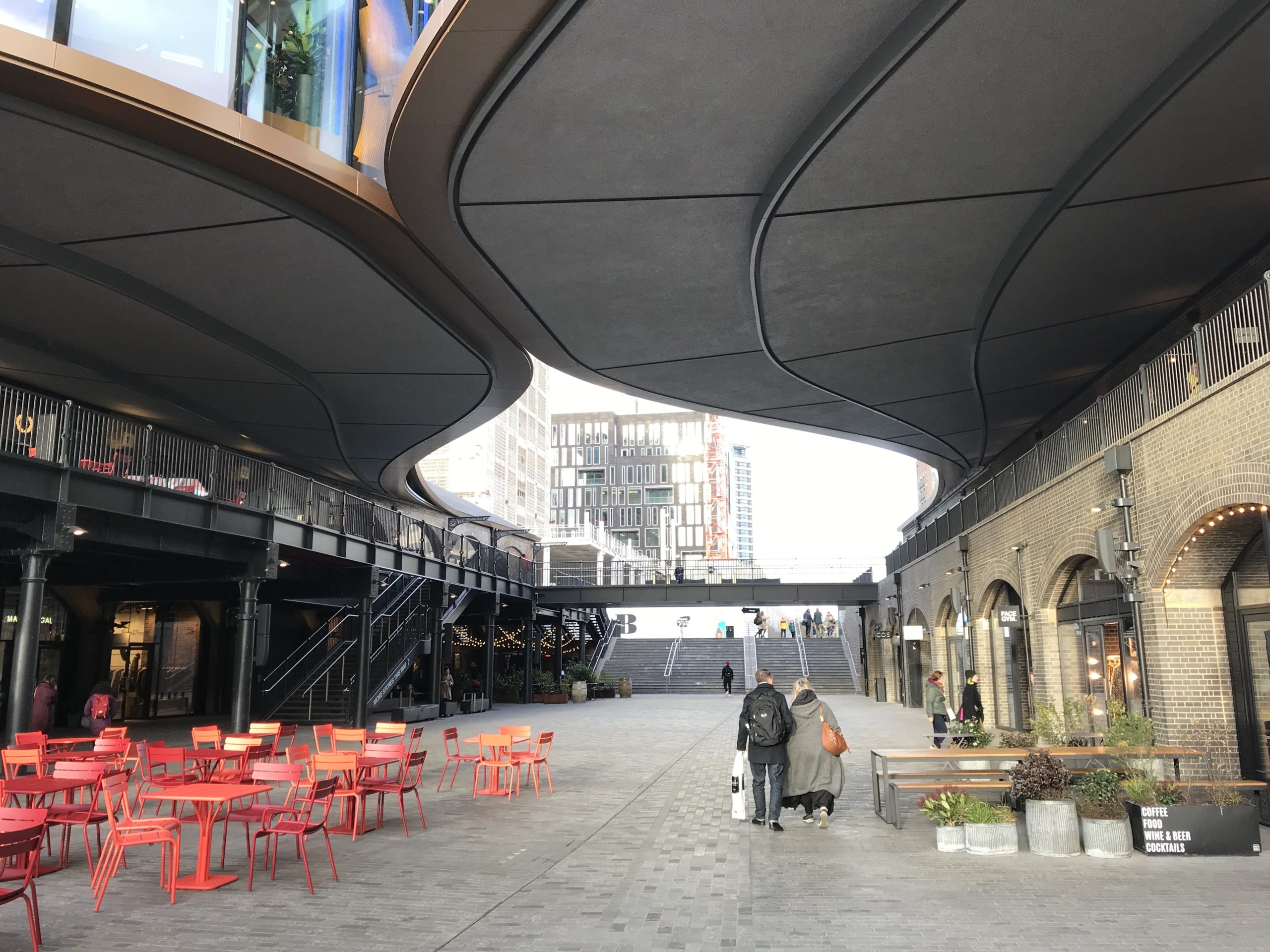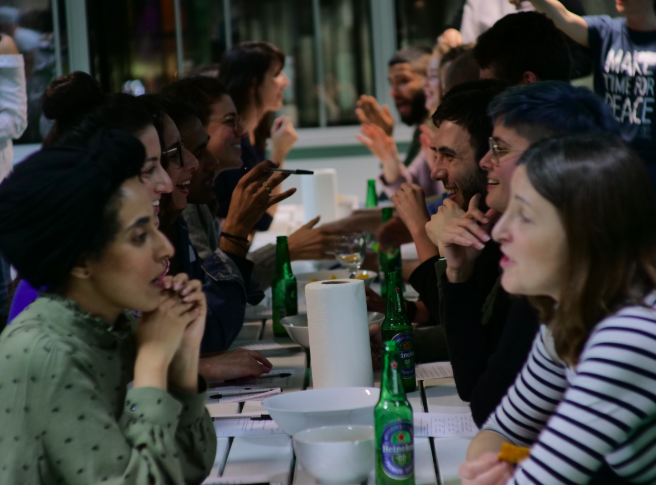Interview with Welcome Kitchen and Presents
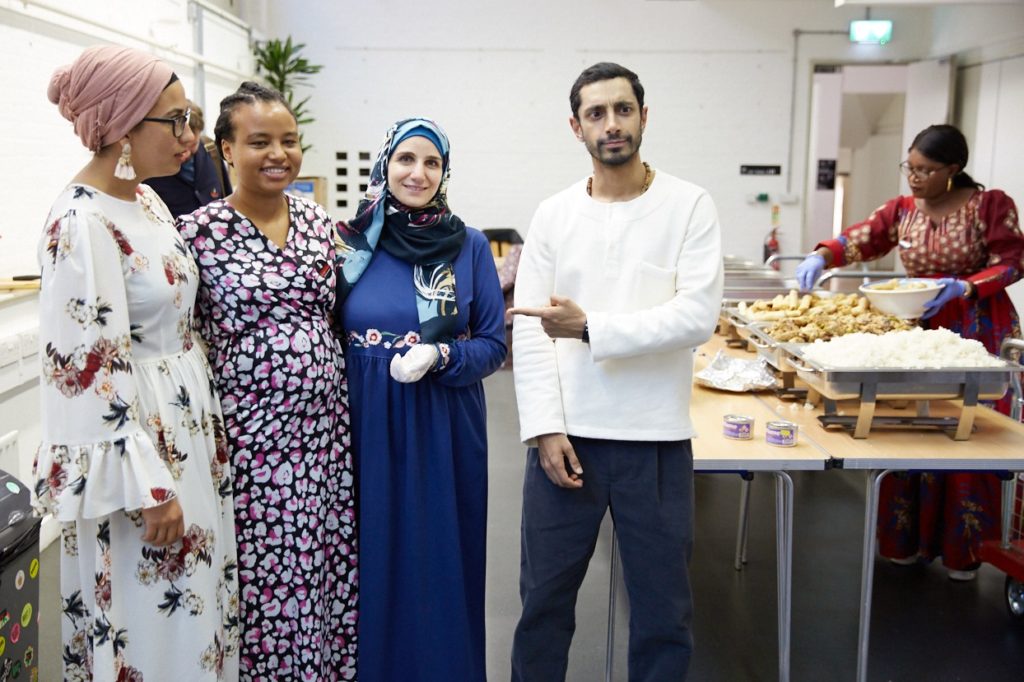
Discover how Welcome Presents, a ground-breaking social integration initiative, is breaking down barriers and fostering connections across cultures through its monthly cross-cultural events celebrating food, film, and friendship.
Thanks for agreeing to be interviewed by TogetherintheUK. We are very interested in what we can learn from organisations that work with migrants and in how we create social connection.
We know you put on amazing, sold out events and that your purpose is: Uniting refugees, asylum seekers & Londoners through a shared love of film, food & friendship
First of all, we would like to know a bit about you:
Tell us a bit about what you do and what your goals are?
Welcome Presents is a social integration project aimed at counteracting the lack of social networks, isolation, cultural differences, discrimination and stigma connected to being a foreigner, as well as address issues of loneliness within the wider population. Welcome Presents provides a monthly cross-cultural event celebrating food, film and friendship with the aim to facilitate an environment and community in which attendees benefit from a regular place they can go where the reception is humane, welcoming, positive and safe. More broadly, our idea of community is shift from one based on locality to one based more on interests, and Welcome Presents fits neatly into this shift, providing a community space based on shared interest and the desire to connect inter-culturally and inter-generationally. Issues of isolation and loneliness impact people across the board, no matter their status, race, religion or age.
What made you understand the need for connection and how did you come up with the idea?
Welcome Presents was born out of our founders’ experience volunteering in Calais during the height of the media frenzy surrounding Europe’s ‘refugee crisis’, witnessing first-hand (through the ‘Unofficial’ Women and Children’s Centre) how loneliness and alienation can be combatted through inclusive community events. At the camp’s ‘Unofficial’ Women and Children’s Centre, residents were able to escape, stay dry and watch a film twice a week through a visiting cinema. In addition, our founders also had contacts with the founders of Open Cinema, which concentrates on working with people dealing with homelessness and deprivation, and took inspiration from the work they did. These people and projects demonstrated the power of cinema in terms of bringing people together, and this is how the original spark for Welcome Presents was born.
After returning from Calais, we held several open meetings in June and July 2016 with refugee friends resettled in London in order to understand what would help ease the settlement process for them. Above all, participants expressed their feelings of loneliness, isolation and a desire to connect, for a space to meet people, form networks, socialise and attend community events in a safe and welcoming environment. In July 2016, our founding team attended the Refugee Summit at Amnesty International, where Amnesty was looking to support groups doing grassroots work with refugees and were very excited to help support and get our idea off the ground; Amnesty continues to host our flagship event to this day.
How did you put together your catering team?
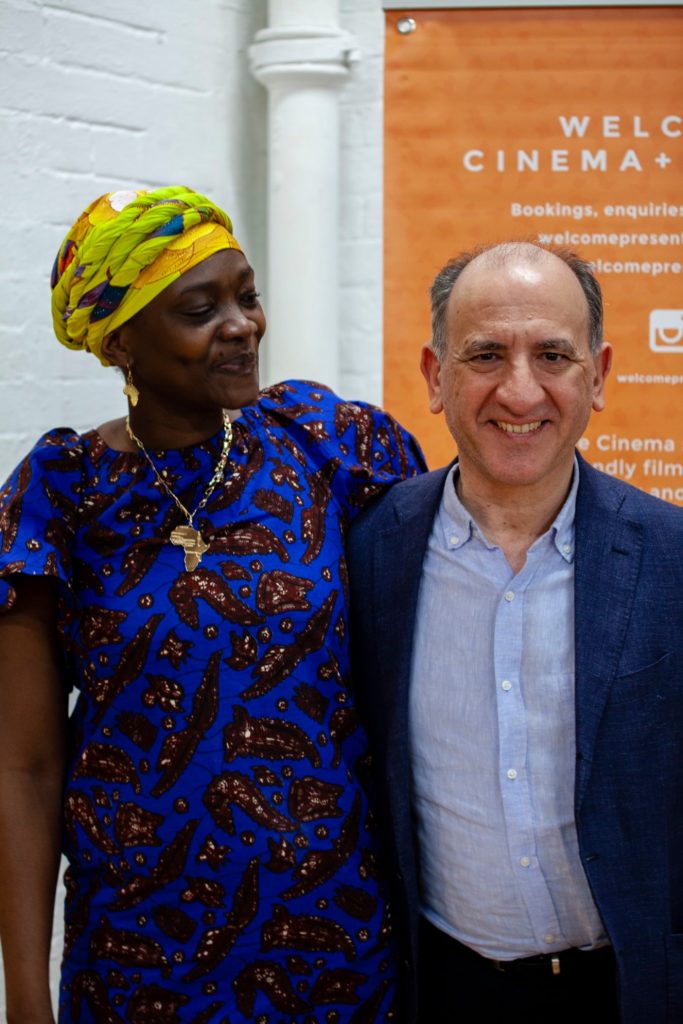
Around the same time (Summer 2016), one of our founding members was also working to help organise a cooking group in Tottenham, the Community Cook Up, which served weekly meals for Tottenham’s homeless community.
Many of the chefs volunteering with the group were refugees themselves, and the idea was floated to add this angle to the project, sharing food, as a positive way to share cultures and give attendees a taste of home.
This is how we met the amazing chefs that now make up Welcome Kitchen and joined forces to become Welcome Presents.
What makes for a great evening?
While there is a lot of preparation involved in the run-up to the event, we at Welcome Presents take a hands-off approach on the night, as what makes for a great evening has little to do with us and everything to do with our audience, speakers, and the amazing chefs of Welcome Kitchen. We are all about building community and bridges, breaking down the barriers between ‘us’ and ‘them’, whoever ‘us’ and ‘them’ may be. So, what makes a great evening is the openness of all those who come to join. The refugees and asylum seekers who’ve endured hardship both in their journeys and in their experiences in the UK, but still come in the spirit of friendship. The local Londoners who maybe have never met a refugee before, but know that what unites us far exceeds that which divides us. The Welcome Kitchen chefs who, every event, make the most delicious spread of diverse food from their countries, a meal which helps to break the ice between people at family style tables, because it’s just so good how can you not talk about it?! Then, we all watch a film together in an intimate, living room style environment and get to engage in conversation and ask questions of some amazingly talented speakers, who also just want to be part of this community. Does it get better than that?
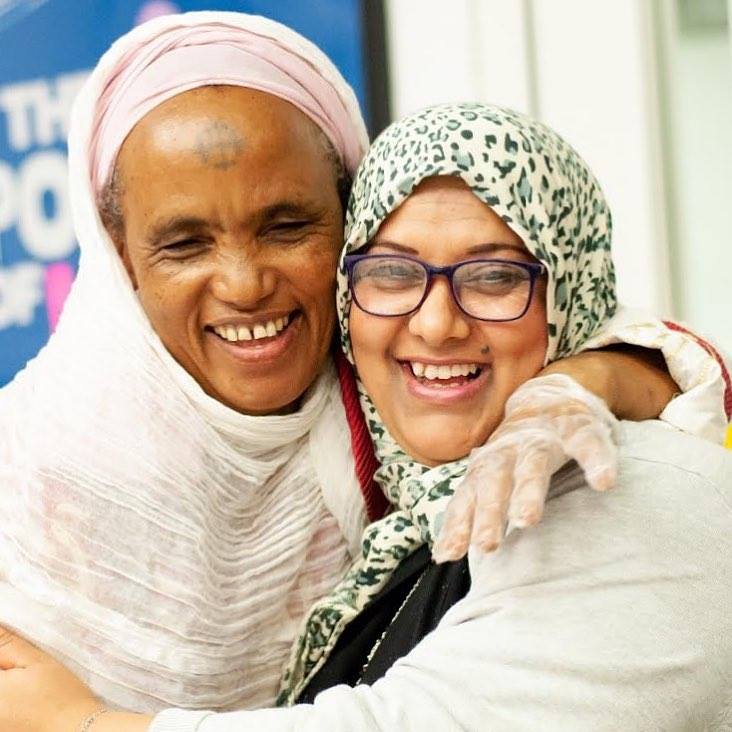
The Welcome Kitchen chefs who, every event, make the most delicious spread of diverse food from their countries, a meal which helps to break the ice between people at family style tables, because it’s just so good how can you not talk about it?! Then, we all watch a film together in an intimate, living room style environment and get to engage in conversation and ask questions of some amazingly talented speakers, who also just want to be part of this community. Does it get better than that?
Why do so many eminent people in the film business speak at your events? Do share some highlights for you.
We are very fortunate that so many amazingly talented and experienced people from the film industry accept to speak at our events. We believe the reason we have been so lucky is due to a several factors. Firstly, we try to approach people who we already believe have an interest and/or passion for the work that we do. People who have publicly expressed interest in building community, an inclusive society, and welcoming difference. So, from the get-go, we already know there is a potential they could be interested in our events. Secondly, we are also fortunate to be connected with and hosted by Amnesty International, whose human rights work and reputation everybody is aware of, and is always helpful when approaching high profile individuals. Thirdly, one of our directors works in the industry herself, and this has proved helpful when we initially approach people to see if they might be interested in participating.
As you said, there have been so many amazing people who have participated, so it’s really hard to choose a favourite, as they’ve all been fascinating and inspiring in their own ways. But, a favourite from this year has to have been when we showed Kes in January and had the amazing Ken Loach speak. It was our first event after the general election, and spirits were quite low as a result. And then we had Ken, who spoke of the fight for social justice he has pursued his whole life, through film, saying ‘don’t give up, there is still hope’. This also feels particularly important in the time we are in now, where we all have to stand together (by sitting at home alone) in order to save each other.
How does what you do help people build their lives in the UK?
What we do helps people build their lives in the UK by providing a space where they feel welcome, where they feel wanted, where they feel free to be themselves, where they don’t feel so alone. Loneliness and isolation are a huge problem amongst the UK population in general, but it is especially pernicious amongst refugees and migrants. Loneliness has been likened to smoking cigarettes in terms of the effects it can have even on a person’s physical health, let alone their mental health. Providing a welcoming space for friendship, socialising, and integration can help to alleviate some of the effects of loneliness, and I’m sure we can all identify with the fact that once you don’t feel so alone, you feel able to positively engage more with your surroundings.
How do people find out about you? In particular, how do you encourage asylum seekers and refugees to attend?
We do outreach for our events through social media channels (Facebook, Twitter and Instagram), as well as posting on event specific websites, emailing organisations whose members might be interested (such as arts and diversity publications and organisations), list in local newspapers, and contact media (for example, Time Out London has listed our events on several occasions). For refugees and asylum seekers, we contact over 10 refugee centres (such as the British Red Cross, Hackney Migrant Centre, Awakwaaba, etc.) with information on our upcoming event, to see if any of their clients might be interested in attending.
What are your top tips for managing cross-cultural events?
The key to managing cross-cultural events is keeping accessibility at the forefront of your mind. While it is impossible to cater to all audiences simultaneously, you can try to make an event as accessible as possible. For example, on any given night we can have over 20 different languages spoken at our events, so we make it a rule that we show only English-language films with subtitles, so that everyone is in the same boat in terms of understanding. Also, we understand that there are a great range of experiences sitting in our audience, some more traumatic than others, so we try to make sure to show films that won’t trigger anyone’s trauma.
This is a difficult question but if you were to give the top 3 things you have learnt, what would they be?
We have learnt so many things over our three years working with and within this community, but there are a few things that stand as clearly the most important. First, if you are trying to work within a community, a top-down approach is not the way to go; you have to get involved and find out what it is they are looking for, rather than assuming you already know. Second, representation is so crucial, not just in the audience, on the screen and on the discussion panel (in our case) but also within the organisation. Your organisation needs to reflect the communities you are working with/within. And finally, you don’t have to do everything yourself, collaborate where you can. Some of our best events have been collaborations with refugee & migrant centres/projects and other organisations. They have expertise built up over years that we don’t have, and instead of trying to reinvent the wheel, working together toward shared goals is so much more effective.
If anyone reading this blog would like to support you, what can they do?
Welcome Presents is an almost entirely volunteer-run project, we run our events solely on funds donated by Help Refugees and Amnesty International’s generous donation of their space, so we are often in need of additional support. If anyone would like to volunteer with us, please do send us an email and we can see how to use your skills. We also have a donate button on our website that links to our crowdfunding campaign, and so those who are unable to volunteer but would like to support us can contribute here! Thank you!

